| A Bibliography of Johnsonian Studies (New York: AMS Press, 2000). | My first book-length publication, an
enumerative bibliography of the scholarship on Samuel Johnson
since 1986. It was published as vol. 33 in AMS Studies in the
Eighteenth Century. A searchable version is
available on-line.
If you really dig the hard copy, you can buy it from Amazon.com. |
 The Age of Elizabeth in the Age of Johnson (Cambridge: Cambridge Univ. Press, 2003). |
An account of eighteenth-century British ideas
about what we now call the Renaissance, and the historical,
intellectual, and cultural uses to which the past was put. At the
center of the study is Samuel Johnson, who serves as a guide to
eighteenth-century thought on sixteenth- and seventeenth-century
Britain. Makes a perfect stocking-stuffer. Buy it from Amazon.com
or Amazon.co.uk. An original and major contribution to the reader's understanding of eighteenth-century cultural identity. — The New Rambler |
 Samuel Johnson's Dictionary: Selections from the 1755 Work That Defined the English Language (Levenger Beach, Fla.: Levenger Press, 2002; New York: Walker & Co., 2003). |
An abridgment of Johnson's
Dictionary, containing about 3,100 of the original
43,000 entries, aimed at the common reader rather than the
professional scholar. The entries are chosen with an eye toward
offering an entertaining and informative selection of the
Dictionary. Get it from Amazon.com. Here comes Dr Lynch of Rutgers University with a selection, 500 pages, but still a selection, of the original 42,773 words. He has added a first-rate essay on dictionary writing in general and the qualities of this one in particular. — Edward Pearce, The Herald (Glasgow) |
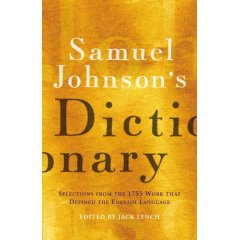 Samuel Johnson's Dictionary: Selections from the 1755 Work That Defined the English Language (London: Atlantic, 2004). |
The UK edition of the book above, available from Amazon.co.uk. |
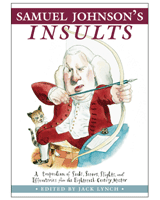 Samuel Johnson's Insults: A Compendium of Snubs, Sneers, Slights and Effronteries from the Eighteenth-Century Master (New York: Walker & Co., 2004). |
Just for fun: a selection of the more amusing
put-downs from Johnson's Dictionary, interspersed
with my own commentary and a number of Johnson's more devastating
comments in real life. Available from Amazon.com in hardcover
or paperback. Alice Roosevelt Longworth once famously said, “If you can't say something good about someone, sit right here by me.” Nowadays Teddy's daughter might advise picking up a copy of Samuel Johnson's Insults, whose subtitle would surely have delighted the old gal: A Compendium of Snubs, Sneers, Slights and Effronteries from the Eighteenth-Century Master. — Publishers' Weekly |
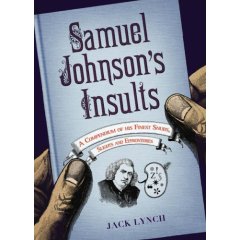 Samuel Johnson's Insults: A Compendium of His Finest Snubs, Slights and Effronteries (London: Atlantic, 2005). |
The UK edition of the title above. Available in hardback from Amazon.co.uk. |
 Anniversary Essays on Johnson's “Dictionary,” ed. Jack Lynch and Anne McDermott (Cambridge: Cambridge Univ. Press, 2005). |
A collection of scholarly essays, co-edited with
Anne McDermott of the University of Birmingham. We assembled a
group of fourteen contributors, including ourselves —
literary critics, bibliographers, lexicographers, linguists
— to discuss the Dictionary in new ways. It
can be had from Amazon.com
and Amazon.co.uk. The anniversary essays celebrate Johnson without resorting to the hagiographical; maintaining a spirit of genuine critical independence, they offer an illuminating overview — as well as insightful detail — on a range of approaches to Johnson as lexicographer (and are informed too by an impressively wide-ranging knowledge of Johnson's other work). The volume is carefully organized, and chapters often intersect productively. — Lynda Mugglestone, Notes & Queries |
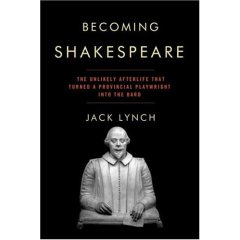 Becoming Shakespeare: The Unlikely Afterlife That Turned a Provincial Playwright into the Bard (New York: Walker & Co., 2007). |
This illustrated history of Shakespeare's
reception from his death to his 300th birthday — how his
works were revived, performed, edited, rewritten, forged, and
worshiped — is meant for educated lay readers, not
scholars. It's available from Amazon.com. Named one of the “Favorite Books of 2007” by the Chicago Tribune. A marvelous trip through four centuries of English literary and theatrical history. . . . Shakespeare's becoming is the real drama, and Mr. Lynch's account of it is worthy of inclusion on anyone's reading list. — Clay Reynolds, Dallas Morning News |
 Becoming Shakespeare: Why We See Shakespeare the Way We Do (London: Constable & Robinson, 2008). |
The UK edition of the book above, available from Amazon.co.uk. |
| Shakespare-nun Shakespare-ka a-ni-da: Mun-Hwa-Young-Eung-Eun O-To-Ke Man-Dul-O Chi-Nun-Ka? (Shakespeare Is Not Really Shakespeare: How Does a Person Become a Cultural Hero?), trans. Song Jeong Eun.] | The Korean translation of Becoming Shakespeare came out from ChungRim Publishing in May 2009. At least I think it's my book; if it weren't for the pictures, I wouldn't be sure I'm holding it the right way up. |
 The English Language: A User's Guide (Focus Publishing). |
A printed book version of my Guide to Grammar and Style, much revised
and expanded. It's available from Amazon.com. Anyone who spends time at all reading or writing, whether for purpose or pleasure, will delight in The English Language: A Users Guide. Lynch's book is not just informative and gracefully written but also it's downright fun to read. I learned more in ten minutes grazing Lynch's book than I would have in an hour plodding through just about any other writers' guide, plus I found myself laughing out loud in the process! It's a pleasure to recommend this wonderful book. — James Lake, Louisiana State University |
 Deception and Detection in Eighteenth-Century Britain (Ashgate Publishing). |
My second scholarly monograph. It's the first
extended treatment of the debates surrounding public deception in
eighteenth-century Britain, and I argue that forgery, fakery, and
fraud make explicit the usually unspoken grounds on which Britons
made sense of their world. Confrontations with inauthenticity, in
other words, bring tacitly understood conceptions of reality to
the surface. It's available from Amazon.com. A masterful and remorseless unraveling of the tangled web of "fakery studies." . . . This is a landmark contribution to eighteenth-century literary and cultural history: the intelligent scepticism of Lynch's study has important implications for all those interested in the status of literary truth, authoriality, the nature of oral transmission, and the validity of evidence. — Philip Smallwood, Professor of English, Birmingham City University |
 The Lexicographer's Dilemma: The Evolution of "Proper English," from Shakespeare to South Park (Walker & Co.). |
My account of the history of “good English”
appeared from Walker & Co. in October 2009. I describe its genesis,
when it was still provisionally titled “Proper Words in Proper
Places,” in my blog.
The finished product is available from Amazon.com. This delightful look at efforts through the centuries to define and control the English language turns out to be a history of human exasperation, frustration and free-floating angst. People tend to go nuts around the English language. — Carolyn See, Washington Post |
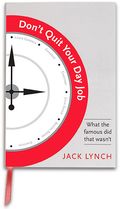 Don't Quit Your Day Job: What the Famous Did That Wasn't (Levenger Press). |
Fifty biographical portraits of famous people who earned a living doing something other than what they were famous for — from the (supposed) stonecutter Socrates and the tentmaker Omar Khayyám; through the novelists Anthony Trollope, who invented the mailbox, and Jules Verne, who worked on the stock exchange; to postal worker William Faulkner, cab-driver Philip Glass, and inventor Hedy Lamarr. |
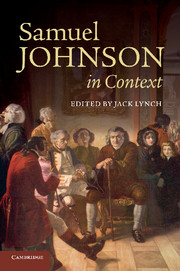 Samuel Johnson in Context (Cambridge Univ. Press). |
Few authors benefit from being set in their contemporary context more than Samuel Johnson. Samuel Johnson in Context is a guide to his world, offering readers a comprehensive account of eighteenth-century life and culture as it relates to his work. Short, lively and eminently readable chapters illuminate not only Johnson's own life, writings and career, but the literary, critical, journalistic, social, political, scientific, artistic, medical and financial contexts in which his works came into being. Written by leading experts in Johnson and in eighteenth-century studies, these chapters offer both depth and range of information and suggestions for further study and research. Richly illustrated, with a chronology of Johnson's life and works and an extensive bibliography, this book is a major new work of reference on eighteenth-century culture and the age of Johnson. |
 You Could Look It Up: The Reference Shelf from Ancient Babylon to Wikipedia (Bloomsbury). |
A history of reference books. In this entertaining "love letter to the great dictionaries, encyclopedias, and atlases," Lynch traces the history of reference works from the ancients to Google and Wikipedia. . . . Great stuff for anyone who loves knowledge, deep or trivial. — Kirkus Reviews Anyone who enjoys reference books will embrace this erudite compilation and Lynch's appreciative, fluent commentary. — Publishers Weekly |
The Oxford Handbook of British Poetry, 1660–1800 (Oxford Univ. Press). |
A gigantic collection — 380,000
words! — collecting the work of forty-some experts in
eighteenth-century poetry. What makes [it] such a valuable resource is its lively and imaginative engagement with the new landscape of eighteenth-century poetry. . . . Lynch's volume daringly refuses to take the easy option. — Jane Darcy, Modern Language Review This is a remarkable collection: forty-three essays, most prepared and written to a very high standard, arranged under seven topical umbrellas. Some of these, such as genre and form, are predictable, but several have encouraged fresh and original work. . . . I learned something new and important from every one of these essays. . . . This is a collection to celebrate. — James A. Winn, The Scriblerian & the Kit-Cats |
Samuel Johnson, A Journey to the Western Islands, and James Boswell, A Journal of a Tour to the Hebrides, edited by Celia Barnes and Yr Most Humble & Obt Svt (Oxford Univ. Press). |
An annotated edition of Johnson's and Boswell's paired travel narratives based on their shared journey through the Hebrides in 1773. |
The Oxford Handbook of Samuel Johnson (Oxford Univ. Press). |
Another gigantic collection of scholarship on Samuel Johnson. |
 The Age of Johnson: A Scholarly Annual (AMS Press). |
Not a book, but big enough that it might as well
be: I've been involved with The Age of Johnson: A Scholarly
Annual for a long time. I came on board as editorial
assistant in 1993; in 1998 I became co-editor with Paul J.
Korshin; in 2005, after Paul's death, I resolved to carry on
solo; as of 2017, I'm joined by another co-editor, J. T. Scanlan,
and after the dissolution of AMS Publishing we've moved the
journal to Bucknell University Press. On another page I provide
information on recent volumes. It has become, deservedly, the leading journal for Johnsonian studies. . . . For anyone with even a moderate interest in Johnson and his times there is absorbing matter here. — Norma Clarke, TLS |